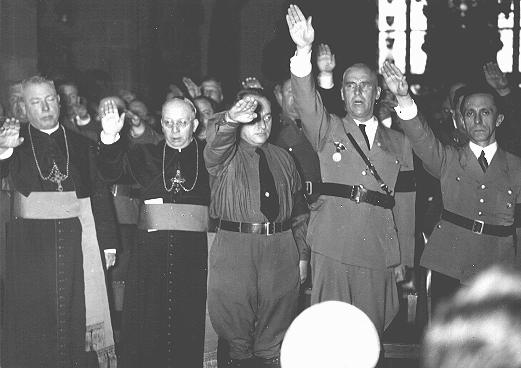I’m not asking this rhetorically, or to be cute, or to set this essay up for an aesthetically pleasing denouement. I want to talk about this seriously, even if it feels awkward and gets ugly.
2020 has been a difficult year. Unfortunately, the role of both Roman Catholic church leaders and the laity in the United States has often been to spread falsehood rather than truth, to enable evil rather than good. It is our responsibility, as members of this church, soberly to take cognizance of the fact that our faith communities are complicit in making matters worse in our nation, especially for the most vulnerable.
I am focusing on the Roman Catholic denomination here, because this is the faith community into which I am baptized and a participant. But it’s not simply about Catholicism. It’s about Christianity in general.
Something is terribly wrong with the Christian church in the world.
Christians ought to be the light of the world and the salt of the earth. When times become difficult, the Christian witness should help to inspire others to carry on. While we know we will not always follow Jesus’s teachings perfectly, that we are flawed, that we are sinners, that the human element will naturally weaken any institution, we also understand that in our Christian communion we are to be Christ’s body here on earth, a witness to radical love and justice.
At every point in history, when a moral challenge arose, Christians ought to have been among the most vocal and most determined, on the side of the good and just. When temptations to do violence to others arise, Christians should demonstrate the grace of Christ in their lives in resisting these temptations, not only personally but collectively.
Whenever a cultural trend came, slowly, to be seen as evil—whether slavery, torture, rape, or oppression of women—Christians should have been on the forefront of clamoring for change. When reform meant suffering, we should have expected to see Christians following the example of the early martyrs, willing to sacrifice for the sake of justice and truth.
Whenever a new form of evil emerged in society, such as colonialism or fascism, Christians ought to have been among the first to see how wrong it was, and ought to have been, repeatedly, a powerful force in opposing it.
Yet this has not happened.
Or, perhaps I should say: it has happened, sometimes, but just as frequently, and sometimes even more frequently, the opposite has happened. The role of Christianity in history appears to be just as mixed and flawed as that of any other extremely powerful institution. We promoted colonialism, sometimes under the guise of mission work. We turned away and were silent about slavery. We largely stayed away from the labor movements of the nineteenth and twentieth centuries. And while other organizations have advanced gender equality, Christian churches—the Roman Catholic Church, in particular—lag far behind. When it came about that a number of powerful prelates in our church were responsible either for sexually abusing others, or for covering these abuses, there should have been zero tolerance, massive reformation, and public penance. Instead we just got, for the most part, more cover-ups, and the demonization of anyone trying to clean house.
In the contemporary United States, Christians who follow the Gospel of Jesus should have been able to see more clearly than any others how sinful and corrupt Trump is, and how morally wrong the MAGA movement. Instead, Christians have made Trump their demi-god. Christians should be working hard for gun control, because Jesus taught us to be nonviolent. Yet Christians put their faith in guns alongside their idolatry of the flag and the nation. We should be energetic on behalf of environmental issues, because we know we are to be stewards and not exploiters of the earth. Yet Christians repeatedly deny climate change, and oppose ecological initiatives (unless, of course, it has to do with a landfill in their own backyard). All forms of discrimination should be repugnant to us, because we know that in Christ there is neither Jew nor Greek, woman nor man. Yet Christians spread lies about Black Lives Matter, and oppose racial justice initiatives in their parishes.
And this year, Christians should have been eager to do anything in their power to protect the most vulnerable among us, especially when all we needed to do was stay home a bit more and wear a mask. Yet Christians are clamoring to open churches, crying out against caps on attendance, refusing to mask, and spreading ridiculous conspiracy theories, many of which are anti-Semitic in origin.
We should not be making excuses for this.
We need to stop saying “oh, the Church is flawed” or “well, the Devil is attacking us.” These same arguments could be made in favor of any other major religion responsible for moral atrocities. Also, we claim to be arbiters of divinely revealed morality. We even demand special privileges and exemptions for the sake of this divinely revealed morality, and try to influence public policy to reflect our beliefs. Striving for this kind of influence, while simultaneously backing terrible leaders and evil policies, is beyond hypocritical. It is blasphemous. We are claiming to be Christ on this earth while acting like the Roman oppressors who murdered him.
Then, when the media portrays us as what we are – racist, prejudiced, or superstitious – we cry persecution. We are very quick to object whenever anyone, secular or religious, makes a point about how Catholics or other Christians behave (badly) in society, yet make no effort to alter the behavior that gives us a bad name. There is a reason why Christianity is associated, in this nation, with far-right agendas, white supremacy, anti-science, and capitalist disdain for the poor.
Christianity should not be attractive to white supremacists.
White supremacists should hate and fear all that the church stands for. Yet look how many converts to Catholicism come bringing their racism with them. Have our “new evangelists” tried too hard to woo these people, by marketing a false version of Christianity, which promises power, superiority, and all the glittering prettiness of “the West”?
Christians who are trying, even if imperfectly, to follow the gospel, may often be tempted to say “not all Christians!” Yet we realize how hard it is to convince others of this, when Trump is repeatedly hailed as the most Christian, most pro-life president ever.
At the same time, we know what a genuine Christian witness looks like.
While church leaders have promoted colonialism, ignored slavery, covered up sexual assault, and enabled fascism, many Christians have nonetheless continued to be light and salt. Christians have defended the rights of the poor and the oppressed, often to the point of being martyred. Christians have worked in solidarity for racial justice, in spite of brutal opposition from the authorities. If we look at the Christianity that has flourished in oppressed peoples, such as in Black churches in the United States, we see what this faith was meant to be. Christianity, when the Gospel is lived, gives hope to the oppressed and comfort to the afflicted.
Institutional church leaders, and the complacent who support them, may to point to the martyrs and witnesses who have stood for justice, and use them to argue that the Church has not been oppressive. “Oh, see those nuns who served the poor? They are proof that none of that other stuff ever happened.” “Catholic leaders joined with Dr. King! Therefore the institutional church always opposed all racism!” This is grotesquely offensive.
I am tired of seeing white supremacist Christians quoting Martin Luther King, or pro-capitalist Christians appropriating Dorothy Day. They have no right to do so when they daily act, and routinely support policies, directly contrary to what King or Day stood for. They try to whitewash Dr. King or turn Dorothy Day into someone tame and pious, even using them as weapons against the reformers of our own day. Be assured, anyone who is attacking Black Lives Matter now would absolutely be attacking the Civil Rights leaders of the past.
The reality is that we have two radically different faces of the church.
And these two faces, or even two completely separate churches, have largely been in opposition to one another. And it’s not that every Christian who has sincerely tried to follow the Gospel has done so perfectly. Yes, we know that sin is present, and humanity is frail. That’s why saints may lose their temper sometimes, why reformers may sometimes fail to be perfectly monogamous, and why all of us have our pettiness, our envy, our addictions, our pride, our failures. Everyone has bad days, lazy days, periods of doubt and temptation. I am not trying to say that there is one church made of sinners, the other of saints. It’s more that we have one church that is trying its best to follow Christ and the Gospel, muddling along in pursuit of truth and justice, while the other appears repeatedly to aid and abet evil. We know that the church has Judas as well as Mary Magdalene, but we don’t expect Judas–or Herod, even–to be calling the shots, over and over.
And no, we can not address this by demanding “unity” if by “unity” we mean a compromise between those who do their best to follow Jesus and those who would happily turn him away at the border or leave him on a street to starve.
Jesus said the world would hate us because of him, and we see that it is true: those who uphold the Gospels and the Beatitudes threaten the powerful and cruel, the powers of the world. I’ve heard it said, often, that there’s a big difference between being hated because we follow Jesus, and being hated because we are assholes. I’ll take it a step further: there’s a difference between being hated because you’re an asshole, and being hated because you are promoting dangerous anti-life lies on a global stage, being hated because you are wholly on the side of lies and violence. Naturally, some of us will be assholes. But we’re supposed to be assholes with access to grace and truth.
This is something we need to address, as we head into a new year, facing crises in our nation for which Christian persons and organizations are responsible. We need to look seriously at our flaws and be willing to accept drastic measures in order to bring about, not only reform, but radical transformation back into what Jesus wanted his followers to be. It’s not enough for us to keep on saying “well, it’s sin” and “we must pray more.” When a faith tradition has gotten to the point of being widely associated with bigotry and hatred, there’s major work to be done.
What that work is I can’t say. I do know, there is good work happening right now, thanks to racial justice leaders in the church, by activists, by educators, by those who serve the underprivileged, those who get involved in power structures and try to fight for the good.
I know, also, I’m not the only one distressed about how much damage the church has done, and wanting to get vocal in acknowledging it.
(N.B.: I like to believe that Pope Francis is aware of how serious this crisis is, but it’s difficult to say, since he is, for all his wisdom, humility, and perception, still from the ranks of the powerful clergy, and I suspect that the reforms we need will be led by laity and women religious).
image credit: CatholicClergyAndNaziOfficials.jpg













